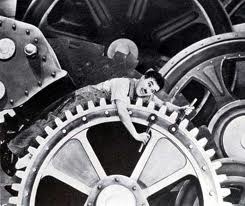Taylorism Transcended

His premise insisted that disciplined observation would yield improved understanding, an application of a basic scientific principle. He believed, as any progressive must, in the possibility for a vastly improved future. That he chose to 'drive' his method when he could not convince others (workers and executives) of its goodness, says more about his personal desperation than it does about the utility of his ideas. One could say that the manufacturing miracle Toyota claims arose from a deeper reading of Taylor rather than a shift further away.
Taylor faced the same blockages any change agent faces, and he mostly worked around them, 'improving production' in spite of executive support more often than by the means of it. By the end (of his career), implementation of his insights were being 'driven' in many organizations, even though he originally proposed his methods as a more human alternative to 'driving' results.
Soros labels this eternal struggle The Will To Power vs The Will To Truth. In the grand paper/rock/scissors game, the will to power almost always trumps. Management Science arose as a response to blunt Will To Power, but then blunted itself by resorting to The Will To Power to implement itself, "for their own good."
I believe that you have to be at least 'so tall' to ride the Systems Thinking roller coaster. The great danger might lie in trying to adapt so that anyone, infant to geriatric, might comfortably ride. As someone, a very long time ago suggested, if they don't get it, shake the dust of their little town off your feet. Move on to more promising territory.
As a means for preserving power, driving results has a longer and more successful track record than any more fully human or conscious technique. In my experience, it's the rare executive who will willingly forego demonstrating their power to drive (even if it’s merely illusory) for the mere possibility that their organization might more profitably direct itself. Napoleon thought Washington a fool for ceding the Presidency.
I might not be making myself clear. I've railed my share about the heartlessness of Taylor's theories. As a case study in successfully implementing wide-spread transformation, Taylor's career stands as both instructive and cautionary. He was a commanding, authoritative presence, and was not above beating into submission clients and colleagues alike. But usually for their own good.
Historical analysis of the Taylor phenomenon include Taylorism Transformed: Scientific Management Theory Since 1945 by Stephen P. Waring (LofC: HD30.5.W37 1991), which concluded that while many apparently different theories of management have appeared post-war, none transcended Taylor. It's a fascinating and extremely well-written analysis, by a historian, not a management consultant.
Also, Management and Ideology: The Legacy of the International Scientific Management Movement by Judity A. Merkle (LofC: HD30.5.M47), tied the stickiness of Taylorism to "the binding of an incipient or new ideology to the systematic use of extensive material rituals" which she noted "had not been accomplished before. ... Scientific Management's message ... was not presented as social philosophy, but as truth.... It was a faith designed for pragmatists. ... it was, as its author claimed it to be, a state-of-mind rather than a series of specific techniques. ... Taylor himself, in spite of his night-school engineering training, admitted that he lacked the background in mathematics to do more than the logical outlines of the system and to apply them by force (both figuratively and literally-he received death threats in the course of his reorganization work) to practical organizations. ... authority combined with ignorance could hardly be expected to raise productivity."
John Dos Passos' prose poem about Taylor, The American Plan, was most descriptive:
It ends...
"But Fred Taylor never saw the workings of the American plan;
in 1915 he went into the hospital in Philadelphia suffering from a breakdown
All his life he'd had the habit of winding his watch every afternoon as fourthirty;
on the afternoon of his fiftyninth birthday,
when the nurse went into his room to look at him at fourthirty,
he was dead with his watch in his hand."
I was in my earlier post apparently failing to point out the similarities between Taylor's technique for introducing his change, without supporting Taylor's techniques or his management philosophy, and what I see even today. His intentions, while naive by some standards, seemed something other than evil. His approach, rather typical and wildly successful, though not even Taylor ever managed to implement his system as he intended. He made his millions not by teaching people efficiency, but by radically improving the manufacture of steel used to make cannon. His story is mostly myth.
His legacy now seems to inhabit that curious pedestal we Americans reserve for past innovators, featuring a cold stone likeness of a once living being and pigeons who mistake the presence for a roost and bathroom.


